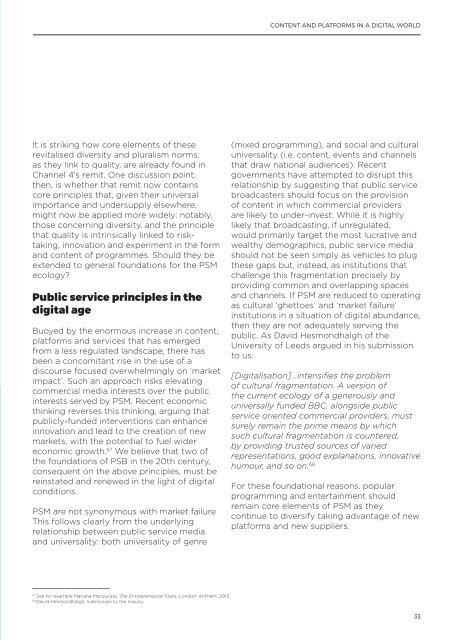A FUTURE FOR PUBLIC SERVICE TELEVISION CONTENT AND PLATFORMS IN A DIGITAL WORLD
FOTV-Report-Online-SP
FOTV-Report-Online-SP
Create successful ePaper yourself
Turn your PDF publications into a flip-book with our unique Google optimized e-Paper software.
<strong>CONTENT</strong> <strong>AND</strong> PLAT<strong>FOR</strong>MS <strong>IN</strong> A <strong>DIGITAL</strong> <strong>WORLD</strong><br />
It is striking how core elements of these<br />
revitalised diversity and pluralism norms,<br />
as they link to quality, are already found in<br />
Channel 4’s remit. One discussion point,<br />
then, is whether that remit now contains<br />
core principles that, given their universal<br />
importance and undersupply elsewhere,<br />
might now be applied more widely: notably,<br />
those concerning diversity, and the principle<br />
that quality is intrinsically linked to risktaking,<br />
innovation and experiment in the form<br />
and content of programmes. Should they be<br />
extended to general foundations for the PSM<br />
ecology?<br />
Public service principles in the<br />
digital age<br />
Buoyed by the enormous increase in content,<br />
platforms and services that has emerged<br />
from a less regulated landscape, there has<br />
been a concomitant rise in the use of a<br />
discourse focused overwhelmingly on ‘market<br />
impact’. Such an approach risks elevating<br />
commercial media interests over the public<br />
interests served by PSM. Recent economic<br />
thinking reverses this thinking, arguing that<br />
publicly-funded interventions can enhance<br />
innovation and lead to the creation of new<br />
markets, with the potential to fuel wider<br />
economic growth. 67 We believe that two of<br />
the foundations of PSB in the 20th century,<br />
consequent on the above principles, must be<br />
reinstated and renewed in the light of digital<br />
conditions.<br />
PSM are not synonymous with market failure<br />
This follows clearly from the underlying<br />
relationship between public service media<br />
and universality: both universality of genre<br />
(mixed programming), and social and cultural<br />
universality (i.e. content, events and channels<br />
that draw national audiences). Recent<br />
governments have attempted to disrupt this<br />
relationship by suggesting that public service<br />
broadcasters should focus on the provision<br />
of content in which commercial providers<br />
are likely to under-invest. While it is highly<br />
likely that broadcasting, if unregulated,<br />
would primarily target the most lucrative and<br />
wealthy demographics, public service media<br />
should not be seen simply as vehicles to plug<br />
these gaps but, instead, as institutions that<br />
challenge this fragmentation precisely by<br />
providing common and overlapping spaces<br />
and channels. If PSM are reduced to operating<br />
as cultural ‘ghettoes’ and ‘market failure’<br />
institutions in a situation of digital abundance,<br />
then they are not adequately serving the<br />
public. As David Hesmondhalgh of the<br />
University of Leeds argued in his submission<br />
to us:<br />
[Digitalisation]…intensifies the problem<br />
of cultural fragmentation. A version of<br />
the current ecology of a generously and<br />
universally funded BBC, alongside public<br />
service oriented commercial providers, must<br />
surely remain the prime means by which<br />
such cultural fragmentation is countered,<br />
by providing trusted sources of varied<br />
representations, good explanations, innovative<br />
humour, and so on. 68<br />
For these foundational reasons, popular<br />
programming and entertainment should<br />
remain core elements of PSM as they<br />
continue to diversify taking advantage of new<br />
platforms and new suppliers.<br />
67<br />
See for example Mariana Mazzucato, The Entrepreneurial State, London: Anthem, 2013.<br />
68<br />
David Hesmondhalgh, submission to the Inquiry.<br />
33


